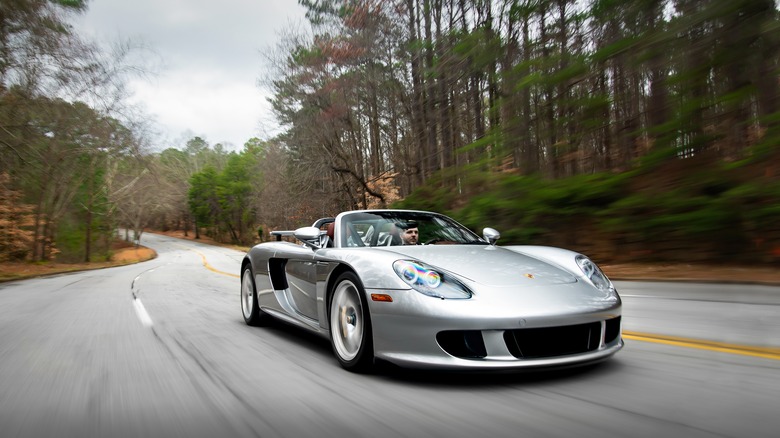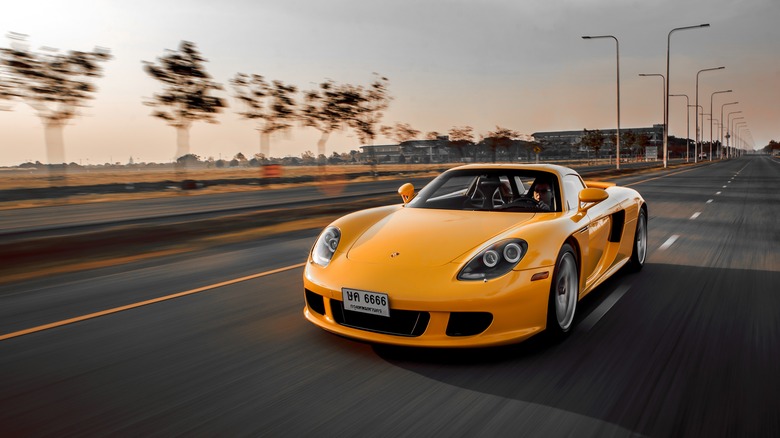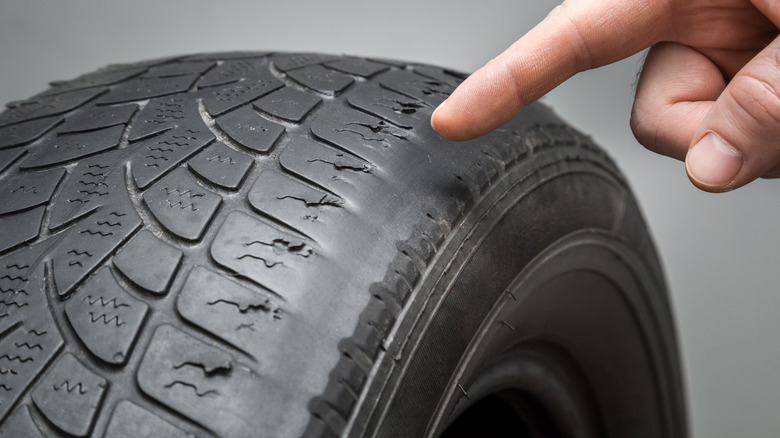Everything To Know About Paul Walker's Fatal Car Accident
On November 30th, 2013, Paul Walker, the "Fast and Furious" lead actor, got in the passenger seat of a car that was bound to be his last ride. Next to him was Roger Rodas, an experienced race car driver. The pair was leaving a charity event in Santa Clarita organized by Walker. According to TMZ, "the driver somehow lost control and slammed into a post or a tree ... and the car burst into flames". Unfortunately, neither survived the car crash.
As the dust settled, the car came under intense scrutiny. Just like in "Fast and Furious" movies, Paul Walker was an avid collector of exotic cars. The one that killed him was also a rare collectible car — but was the car to blame for his death? Or was the accident a consequence of dangerous driving? Here is everything you need to know about the car that killed Walker.
It was a Porsche Carrera GT
The car that killed Walker was a 2005 Porsche Carrera GT owned and driven that fateful day by his friend, Rodas. The Porsche Carrera GT is a sports car with a powerful 5.7-liter V10 mid-engine with an output of 612 PS — the equivalent of 603 hp. How fast is it? The Carrera GT can accelerate from zero to 60 mph in about 3.5 seconds, and it can achieve a maximum speed of 205 mph. It was super-fast back in 2004 when it was first sold, and even by today's standards, it's incredibly fast. This is because the Carrera GT's engine was designed to race in the 2000 24 hours of Le Mans, but Porsche decided to make it street-legal.
Another cool thing about the Porsche Carrera GT is the exquisite body with a removable roof — it doesn't look like any other Porsche sports car on the road, yet it maintains the Porsche signature look. According to Porsche, the chassis of the Carrera GT is made of carbon fiber to reduce weight. Every single body part on the Porsche Carrera GT serves a purpose to improve the performance, and like any sports car that was designed for 24 hours of Le Mans, you can push it to the limit and it won't overheat.
So exclusive is the Porsche Carrera GT that only 1,270 units were made between 2003 to 2006. At the time, it was sold at around $440,000 — but today, it's a classic car selling for over $1 million.
The Porsche Carrera GT is difficult to control
In a Top Gear episode, Jeremy Clarkson said the Porsche Carrera GT "isn't an easy car to control ... the clutch is brutal, the power is savage, and the handling, you really are on a knife edge." Even The Stig, Top Gear's race driver, had a difficult time controlling the Porsche Carrera GT on his first attempt. This is because the Porsche Carrera GT doesn't have stability control — it was one of the reasons that Walker's daughter sued Porsche after the accident (via The Washington Post).
Interestingly, this wasn't the first time that Porsche was sued for a fatal accident with a Carrera GT. Six years before Walker's death, Porsche was one of the accused parties in a lawsuit where the claimant argued that the lack of electronic stability control in the Carrera GT was one of the contributing factors that caused an accident (via Sports Car Market).
What's even more complicated is that the car is designed with a six-speed manual transmission. This means that if you're driving a Porsche Carrera GT using a manual transmission and without stability control, you would probably find it challenging to steer especially on corners. Car collector and comedian Jay Leno almost crashed into a wall while driving a Porsche Carrera GT on a race track — and he shared his experience on Popular Mechanics.
Walker wasn't so lucky. Investigations concluded the Porsche Carrera GT that killed him was moving at speed of between 80 mph to 93 mph. However, his daughter disputed that speed in the lawsuit by claiming it was between 63 mph to 71 mph.
The Porsche had old tires
According to Consumer Reports, the Porsche Carrera GT that killed Walker had two tires that were almost nine years old. Autoweek also reports that the Porsche Carrera GT had 3,283 miles on the odometer. In essence, it wasn't driven very often since it was a collectible sports car — and it was probably the reason why the tires weren't changed for nine years.
Several Porsche dealer sites recommend that you replace the tires after five years. This is because tires are made of rubber, which degrades even if you don't take your car out for a drive. Let's put it this way: if you're driving a Porsche Carrera GT at high speed with no stability control, and the tires are worn out, a slight miscalculation by the driver could cause the car to spin out of control and crash.
The Porsche Carrera GT was discontinued
Seven years before Paul Walker's death, Porsche Carrera GT was discontinued because of new airbag regulations stipulated by the National Highway Traffic Safety Administration (NHTSA). Per the regulations, all new vehicles were required to include dual-stage airbags as a safety precaution. However, it's unlikely that the dual-stage airbags would have prevented Walker's death, considering that the car exploded after impact. However, according to the coroner's report, Walker did succumb to traumatic injuries — as reported by All That's Interesting.
The lack of dual-stage airbags in the Carrera GT was not a point of contention that was raised by Walker's daughter in the lawsuit against Porsche. The airbags were deployed during the crash, and both passengers were wearing seatbelts. It was established that Walker was trapped in the car before it caught fire, and the lawsuit argued that the seat belt system and fuel line were defective — and if they were designed better, maybe Walker would have survived. The lawsuit also argued that the Carrera GT didn't have a reinforced crash cage.
Porsche denied any liability but chose to settle the lawsuit filed by Walker's daughter out of court for an undisclosed amount (via ABC News). A judge also dismissed a different lawsuit filed by Rodas' widow against Porsche due to insufficient evidence — according to NBC News. So far, however, no court ruling concluded the Porsche Carrera GT's design was to blame for Walker's death.




